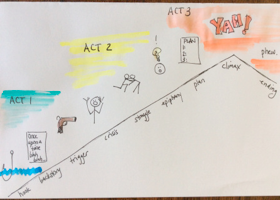– Wages –
By Jon Reed
Once upon a time, companies paid employees by handing them paper checks issued by a payroll department every other Friday afternoon. Not surprisingly, attendance was higher those days, much to the irritation of management. Except, of course, if Michigan’s first day of deer season fell on a November 15th Friday, few employees showed up at all. Paper checks were standard before computers existed and commercial banks had improved electronic abilities. Handing over pay to civilian workers was a little different than the United States military pay system for servicemen at the time.
After enlisting in the United States Air Force, I discovered the difference. At the end of our second week in basic military training, we were lined up to receive our first pay. We had been screamed-at and harangued for so long, we were being handed cash for belonging to the military. Standing under a broiling sun, surrounded by snakes and scorpions, it was quite bizarre for a young man at the time. We were paid something like $30 in greenbacks, although memory fails after so long. It worked out to about 600 hours or five-cents an hour, somewhat less than my salary as an engineer only a few weeks before.
Sergeant Tough Guy sat with an open cash box on a card table. Near his right hand lay a loaded M1911 Colt .45 caliber automatic pistol pointing right at us. I suppose it was meant to prevent foolish people from making a grab for the money. I had no idea whether the gun would go off if the card table collapsed, but I’m sure it would have put a large hole through several trainees with a single round. Oddly, there is no history of anyone robbing a Lackland Air Force basic military training cash box.
Of course, with $30 to spend every two weeks, like everyone else I had no idea what to do with it because there was no place and nothing to spend it on. The Post Exchange only sold toiletry articles, chewing gum, magazines, and souvenir United States Air Force tee-shirts. No one wanted more souvenirs than bad memories of crawling through live-fire training ranges under barbed wire and mines exploding to keep things interesting. No, we had enough souvenirs, thank you. Returning to civilian life after the military, I was glad our company didn’t line us up for our pay every other Friday with a loaded .45 pointed in our direction.
But it changed in the early-seventies when we were informed wages would henceforth be automatically transferred to us in a new Direct Deposit Program without worrying about lost time and paperwork costs. A week before the new program was to begin, my wife and I discussed the changes it would bring. We decided to split our responsibilities so she could manage most of it. Thursday afternoon before the program began, I called home and she said, “We need some cash for the weekend. Can you stop at the bank and get $180? We need two fifties, three twenties, and two tens.”
I was confused, thinking she didn’t understand the program. “Listen, it’s Thursday. We don’t get paid until tomorrow, Friday, the 15th of the month. We don’t have $180, in our account. I’ll go to the bank tomorrow night or Saturday. I can’t go today and try to take out more money than is in our account.”
“Yes, you can. The transfer to our bank takes place tomorrow morning at 12:01 am Friday. The bank cannot register a withdrawal transaction this afternoon until tomorrow and the start of Friday’s business day.” She was growing impatient. “Listen. Just tell them your wife said it’s alright. And could you pick up some clean clothes from the dry-cleaners on Michigan Avenue, afterward?”
I hung up thinking trying to withdraw money that wasn’t there couldn’t work and I would be painfully embarrassed. Besides, I’d never heard of anyone walking out of a bank with more money than they had on deposit unless they were waving a gun and chased by wailing squad cars. And what was with the dry cleaners request? How can anyone pick up dry-cleaner clothes without a ticket?
I pulled up to a teller’s window at 5:30 pm that afternoon and filled out a withdrawal slip. Minutes later, the vacuum canister whooshed away a piece of paper requesting two $50’s, three $20’s, two $10’s, along with my driver’s license. A querulous, disembodied teller’s voice came over the inter-com, embarrassed and confused, as if dealing with early dementia. “I’m sorry, sir, but you don’t seem to have enough money in your family account to cover this transaction.”
I could feel my face blushing but no one was around. This was exactly what I didn’t want to happen. All I could say was, “Well, we’ve just implemented a Direct Deposit Program. My wife said my salary for this pay period will be transferred to the bank at 12:01 am before the Friday business day begins … and that to tell you that it’s alright.”
There was a slight pause while this was assimilated, and I wondered whether the bank’s security personnel or city squad cars would begin arriving with wailing sirens. Instead, a sympathetic voice came back, “Oh. Well then. It’s alright then, isn’t it?” The vacuum tube whooshed and the canister came back with a clunk, complete with $180, bank slip, and driver’s license. “Have a good day, sir.”
I drove away, still wondering about the power of a wife’s permission and direction. Now greatly emboldened, I walked into the dry-cleaners shop ten minutes later and gave my name before mentioning I didn’t have a ticket to pick up our clothes. But my wife had said it was alright. The owner gave me a long look and shrugged, before I paid the bill and he handed over the clothes. As I put them in the trunk, I realized I was set for life; all I had to do from then on was say, “My wife says it’s all right” and I could get away with most anything.

